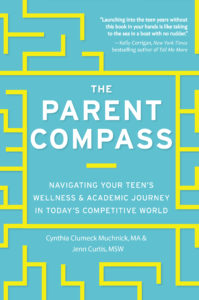
Rejected?: Rethinking College Admission Decisions and How to Support Your Kids
Jenn Curtis, MSW is the author of The Parent Compass and she is an educational consultant, author, speaker, and the owner of FutureWise Consulting. She has guided hundreds of high school students and their families through all aspects of the college admission process. Read along as she gives you and your family advice on how to navigate college admissions.
The Month of Rejection
If I’m being honest, sometimes I feel as though I wake up every morning to a dream job.
As a college counselor, I have the privilege of watching my students experience growth, self-discovery, and mastery; become empowered; and develop their own unique voices alongside critical self-advocacy skills. Cheering my students on as they stretch themselves and offering an enthusiastic thumbs up when they embrace a challenge punctuates my work life. But the reality is that one single month of the year also dominates so much of our work together. That’s because it’s in that month—March—that most college decisions are released.
As a result, March becomes the one month of the year that I associate with the most tumultuous roller coaster I’ve ever braved: extreme, exhilarating highs (“I got in!”); utterly confusing, head-spinning twists and turns (“Wait . . . what does ‘waitlisted’ even mean?”); and gut-wrenching, stomach-churning lows (“I was rejected”). It’s on these final three words that I want to take a hard pause because, really, that overused triad is what I intend to focus on here.
So, I’ll repeat it again: “I was rejected.”
Admissions and Adequacy
When a student reaches out to let me know a college’s admission decision, if the decision was not to accept them, I am informed that he or she was “rejected.”
The fact is that I’m not aware of a single college that uses any form of the word “reject” when communicating admission decisions. Instead, they use phrases like “unable to offer admission” or “not able to offer a place.” Nevertheless, “rejected” has needlessly wormed its way into the college admission vernacular.
The verb form of the word “reject” means “to dismiss as inadequate, inappropriate, or not to one’s taste.”
Wait.
When did an unfavorable admission decision come to be so tied to self-worth that our kids interpret it as an indication that they are “inadequate”?
Flip the Script
Surely, we know that our kids are “to taste,” “adequate,” and “appropriate.”
Colleges have to make difficult decisions, ones that are based on their own priorities—priorities that can shift year to year—and ones that sometimes don’t make much sense to the rest of us. We know there is a perfect place out there for our kids to try on adulthood, to challenge themselves, and to stretch past perceived limitations. So how do we help them see that amidst heartbreak, altered plans, and disappointment?
My challenge to you is to begin by flipping the script on college “rejections.” Let’s vow to change our vocabulary to reflect what an unfavorable admission decision actually is: a hope that didn’t come to fruition or a disappointment that opens doors to other thrilling possibilities.
5 Tips for Parents and Families
I co-authored The Parent Compass: Navigating Your Teen’s Wellness and Academic Journey in Today’s Competitive World to give parents the tools to adopt the kind of parenting strategies that lead to their teens’ academic success and emotional well-being.
Here are some Parent Compass tips to help you and your teen navigate college admission decisions:
- Start early. Have multiple frank conversations with your teen before admission decisions come out. Open communication that conveys unconditional love and support regardless of the outcome can help soften the blow of disappointment.
- Dance and sing if the decision is a positive one, but think before you post on social media. Be sensitive to others’ admission decisions, which may not be positive. Humility unfailingly goes a long way.
- Eliminate the word “rejected” from your vocabulary when discussing admission decisions. Encourage your child to talk about their “unfavorable decisions” or “closed doors” as opposed to their “rejections.”
- In the face of disappointment, help your teen focus on the qualities of the schools to which he or she has been accepted that fit well with his or her learning style and learning objectives. Avoid focusing on the names of the schools and instead focus on what opportunities your student will encounter there.
- Urge your community or your teen’s school to organize a senior college day that encourages students to wear shirts that simply say “College” or “My College, My Choice” in lieu of publishing college acceptance lists or planning senior college sweatshirt days that promote specific schools.
Roller coasters are at once thrilling and terrifying. This year, more than any other, both ends of the spectrum are likely to intensify. As you and your teen navigate March and the months beyond, enjoy the ride and remember to acknowledge your teen’s pain while placing focus on the possibilities.

